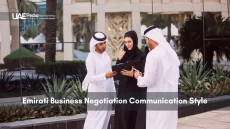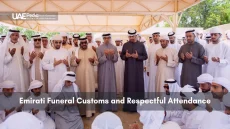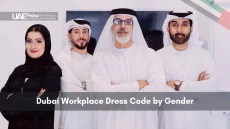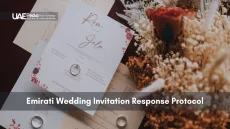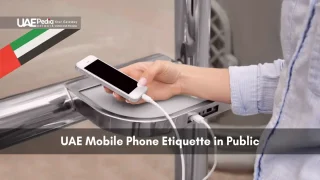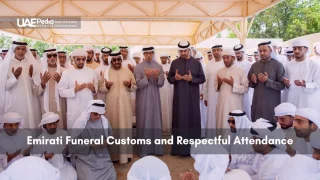Did you know over 200 nationalities coexist in the UAE’s workplaces? This cultural mosaic creates a corporate environment where ancient traditions share space with glass-walled boardrooms. Getting it right requires more than polished shoes and firm handshakes—it demands cultural fluency.
In this crossroads of global commerce, relationships often start with a cup of gahwa (Arabic coffee) rather than email threads. The local approach blends Bedouin hospitality with modern efficiency—a dance of respect where titles matter, but genuine connection matters more. From the majlis seating arrangement to the rhythm of meetings, every detail carries meaning.
We’ve watched newcomers thrive by embracing three principles: adaptability, observation, and patience. The region’s economic growth—fueled by strategic planning visible in initiatives like the UAE’s market expansion efforts—rewards those who balance ambition with cultural awareness. Whether you’re sealing deals in DIFC or networking in Sharjah, understanding unwritten rules separates temporary visitors from trusted partners.
UAE business culture is an integration of Islamic hierarchical norms and global operational standards. Decision-making is top-down (≈ 76 % of firms), authority is strongly correlated with age, family name and seniority (wasta). Relationships precede transactions; initial meetings serve to validate respect and trust, not to negotiate terms. Five daily prayer windows, lunar holidays and shortened Ramadan hours directly shape calendars and must be blocked in advance.
Professional conduct is codified, use formal titles (“Sheikh”, “Dr.”) and the greeting “As-salaam Alaikum”; address the most senior attendee first; exchange documents and business cards with the right hand; dress modestly (knee-length attire, covered shoulders); avoid public eating, drinking or loud phone use during fasting hours. Business hours run Sun–Thu; external meetings are best scheduled before Dhuhr prayer or post-iftar in Ramadan. Digital tools coexist with printed agendas and face-to-face majlis sessions; expect iterative approvals and multi-week consensus-building phases.
Key Takeaways:
- First meetings emphasize titles and respect.
- Prayer times shape daily business rhythms.
- Dress codes blend tradition and formality.
- Hierarchy guides approvals and decisions.
- Face-to-face networking builds real trust.
- Adaptation and patience drive long-term success.
Understanding UAE Business Culture and Traditions
Ever noticed how Emirati boardrooms smell like frankincense and fresh contracts? The Arab Emirates’ corporate world thrives on dual rhythms—centuries-old Islamic principles harmonizing with 21st-century globalism. To navigate this space, you’ll need more than spreadsheets; think cultural compasses.
When Faith Meets Finance
Islam’s ethical framework shapes everything here. Concepts like amanah (trustworthiness) influence contracts, while midday pauses for Dhuhr prayers reset priorities. Major companies like Emirates NBD build prayer rooms alongside conference halls—a silent nod to spiritual needs. “Our values aren’t just plaques on walls,” a Dubai-based CEO once told me. “They’re why handshakes still seal deals.”
The Expat Effect
With 89% expatriates in the workforce, the UAE’s business practices resemble a cultural cocktail. Indian negotiation styles blend with Emirati hospitality, while European punctuality meets flexible Gulf timelines. This mix creates hybrid strategies—like combining wasta (relationship influence) with data-driven pitches. Pro tip: Observe how teams celebrate Eid and Diwali with equal enthusiasm.
“Diversity here isn’t a buzzword—it’s breakfast. You’ll debate marketing plans over karak chai with colleagues from six continents.”
Success hinges on respecting this duality. Learn basic Arabic greetings, but don’t stress over fluent phrases. Notice when colleagues switch from suits to kanduras for Friday meetings. These nuances build trust faster than any PowerPoint deck.
Read More:
Navigating Religious Customs and Business Etiquette
Have you ever rescheduled a conference call for sunset? In the UAE’s corporate landscape, daily rhythms sync with spiritual traditions. Five prayer pauses shape office hours, while lunar months like Ramadan transform workflows entirely. Here’s how to harmonize global deadlines with local devotion.
Observing Prayer Times and Adaptations
Meetings often pause when the adhan (call to prayer) echoes across skyscrapers. Smart planners:
- Block 15-minute buffers before Dhuhr (midday prayer)
- Avoid critical presentations during Friday sermons
- Use apps like Muslim Pro to track prayer timings
During Ramadan 2025, both public and private sectors reduce working hours by two hours per day—plan buffers accordingly. Ref.: “Ramadan Working Hours & Business Etiquette in the UAE” (2025). PCR.ae.
During Ramadan, offices reduce hours by 2-3 daily. “We shift brainstorming sessions to post-iftar when energy peaks,” shares a logistics manager in Abu Dhabi. Pro tip: Gift dates to fasting colleagues—it’s like bringing coffee to a 9 AM meeting.
“Ramadan isn’t slowdown season—it’s relationship-building time. Sunset meals become strategy feasts.”
Watch for these scheduling traps:
- Assuming all teams break fast simultaneously (varies by nationality)
- Sending urgent requests during suhoor (pre-dawn meals)
- Forgetting that public holidays shift yearly with the Islamic calendar
Global teams adapt by holding hybrid meetings: Zoom for international partners, in-person for local stakeholders. It’s about respecting time zones—both earthly and celestial.
Avoid critical meetings during suhoor and adhan pauses to prevent interruptions—prioritize flexible time slots. Ref.: “Navigating Business Etiquette with Grace During Ramadan” (2025). Kent Consulting.
The Art of Greetings and Non-Verbal Communication
Ever wondered why a handshake here feels like a three-second résumé? In the UAE’s corporate environment, first impressions blend centuries-old customs with global professionalism. Your opening smile and stance often set the tone before a single word is spoken.
Proper Salutations and Respectful Address in Meetings
Start with “As-salaam Alaikum” (Peace be upon you)—this warm greeting shows cultural awareness. When addressing counterparts, use titles like “Sheikh” or “Dr.” until invited to be informal. A regional HR director notes: “Mismatched titles can derail talks faster than a sandstorm.”
Body language plays a crucial role here. Maintain eye contact without staring—it signals trust. Men wait for female counterparts to initiate handshakes. Avoid crossed arms; open palms suggest transparency. These nuances shape management relationships more than you’d expect.
“We’ve seen deals flourish when visitors mirror local etiquette—light handshakes, slight head bows. It’s like speaking a silent dialect of respect.”
For junior colleagues, a friendly nod works. With seniors, add a hand-over-heart gesture after shaking hands. The benefits? You’ll navigate hierarchies smoothly while building rapport. Pro tip: Practice greeting exchanges with a local mentor—it’s like cultural dress rehearsal.
- Common titles: Sheikh (royal/tribal leader), Sayyid (Mr.), Ustadh (Professor)
- Gesture guide: Right hand for greetings/transactions, never point feet at others
Essential Dubai Business Introduction Protocol Hierarchy
Ever watched a corporate greeting unfold like a carefully choreographed dance? In the Emirates’ professional world, initial interactions follow structured processes governed by unspoken rules. From entry-level startups to Fortune 500 branches, how you approach first meetings can make or break partnerships.
Seniority dictates the rhythm here. Meetings typically begin with the highest-ranking attendee speaking first—a practice mirrored in local giants like Emaar Properties. You’ll notice junior team members often wait for cues before contributing. “Our approval processes mirror this order,” shares a project lead at a Sharjah energy firm. “Ideas flow upward, decisions cascade downward.”
| Element | Western Approach | Emirati Custom |
|---|---|---|
| Greeting Order | Rotates casually | Starts with most senior |
| Decision Timeline | Direct to decision-makers | Multi-layer reviews |
| Document Exchange | Digital-first | Printed copies preferred |
Trust grows through repeated face-to-face interactions rather than virtual exchanges. Many established businesses prioritize in-person introductions, viewing them as trust-building rituals. A Dubai logistics company manager explains: “We’ll schedule three coffee meetings before discussing contracts—it’s about assessing compatibility beyond spreadsheets.”
“Skip the hard sell during first encounters. Here, relationship capital outweighs transactional urgency.”
Successful strategies blend respect for hierarchy with cultural flexibility. Global enterprises to local businesses thrive by:
- Researching attendees’ roles beforehand
- Allowing extra time for multi-tier approvals
- Using formal titles until invited otherwise
This blend of cultures creates unique opportunities. Those who navigate multiple cultures while honoring structured processes often unlock lasting professional alliances.
Always let the most senior attendee open discussions—Emirati firms mirror this protocol in decision cascades. Ref.: “Lauren Seberos. (2024). UAE Business Culture: 10 Things You Need to Know. RemoFirst.”
Adapting to Dress Codes and Professional Presentation in Dubai
Picture a high-rise lobby where flowing white kanduras brush shoulders with Italian-tailored suits. This sartorial dance reveals the UAE’s unique approach to professional attire—honoring heritage while embracing global trends. Your wardrobe here becomes a visual handshake, signaling respect for local values and modern sensibilities.
Threads of Tradition Meets Tailored Modernity
Emirati professionals often wear kanduras (long white robes) and abayas (elegant black cloaks), garments reflecting cultural identity and modesty. International counterparts typically opt for conservative suits in neutral tones. A real estate CEO notes: “Clients notice pressed collars before spreadsheets—it shows attention to detail.”
“Dressing well here isn’t vanity—it’s vocabulary. Your clothes speak before you do.”
Sector-specific norms create varied expectations:
- Corporate settings: Dark suits rule, but some tech startups allow smart casual
- Government meetings: Full suits mandatory, even in summer heat
- Networking events: Blazers over kandura-inspired tunics bridge cultures
Seasoned professionals recommend these strategies:
- Pack breathable fabrics for outdoor real estate tours
- Choose closed-toe shoes for formal UAE business engagements
- Keep a neutral scarf handy for unexpected mosque visits
Successful business interactions often hinge on this visual harmony. A crumpled shirt during contract talks can undermine credibility faster than a weak proposal. Yet overdressing for casual tech meetups appears stiff. The golden rule? Observe then adapt—like chameleons with collar stays.
Scheduling Meetings and Navigating UAE Business Hours
Ever tried scheduling a meeting between noon prayers and lunch breaks? The UAE’s corporate clock ticks to a unique rhythm—one that rewards planners who sync with cultural cadences. Here’s how to align your calendar with local norms while keeping productivity soaring.
Failure to comply with UAE’s work-hour reductions during Ramadan can trigger legal penalties under Federal Labour Law No. 3. Ref.: “Ramadan in the United Arab Emirates” (2025). Wikipedia.
When Clocks Bow to Tradition
Workweeks run Sunday to Thursday here, with Friday-Saturday weekends. But watch for curveballs: Ramadan shifts office hours earlier, while summer sees some companies adopting four-day weeks. A Sharjah project manager shares: “We once juggled teams across three time zones—Dubai, Mumbai, and New York. Solution? Slot meetings post-Asr prayer when everyone’s online.”
“Smart scheduling here isn’t about cramming slots—it’s choreographing harmony between deadlines and devotion.”
Top strategies for seamless planning:
- Book morning meetings before Dhuhr (noon prayer)
- Avoid 1-3 PM slots—peak lunch/rest hours
- Confirm times twice: Cultural events can shift schedules
Tech teams often use hybrid approaches. One Dubai app developer coordinates with New York via shared cloud docs during UAE mornings, then hosts video calls after US offices open. This dance maximizes overlap without burning midnight oil.
Pro tip: Track moon phases. Islamic holidays like Eid change annually, potentially voiding your carefully crafted Q4 calendar. Apps like Hijri Calendar help anticipate these shifts.
The Role of Networking in Building Business Relationships
Ever walked into a room buzzing with three languages and six industries? That’s Tuesday in the Middle East’s corporate world. Here, connections form faster than sand dunes shift—but only if you know where to plant your feet. Relationships here aren’t transactional pitstops; they’re marathon training for professional endurance.
Leveraging Local Introductions and Corporate Events
Emirati business culture thrives on warm referrals. A trusted contact’s endorsement works like a golden ticket—especially in Abu Dhabi’s government sectors. Tech summits at Yas Conference Center or luxury expos at Emirates Palace aren’t just events; they’re curated stages for organic relationship-building. “Our best partnerships started with a mutual friend’s coffee invitation,” shares a fintech founder who secured funding through a date farm tour with investors.
“Skip the LinkedIn cold messages. Here, a five-minute gahwa chat often achieves what months of emails can’t.”
Importance of Face-to-Face Interactions
Virtual meetings have their place, but screens can’t replicate the trust forged over shared meals. In the Middle East, breaking bread (or dates) signals commitment. A Dubai-based HR director recalls sealing a merger after bonding with a client’s family during Eid celebrations: “They needed to see I valued their traditions as much as their revenue.”
Cultural sensitivity transforms networking from awkward small talk to meaningful exchange. Observe how Emirati executives exchange business cards—always with the right hand—or why some pause discussions during prayer times. These nuances whisper respect louder than any elevator pitch.
Bridging Communication Nuances Between Cultures
Ever noticed how silence speaks louder than words in some meetings? In cross-cultural exchanges here, what’s not said often carries more weight than bullet-point agendas. This dance of implication and intuition separates transactional chats from meaningful dialogue.
Western directness can clash with indirect local styles. A delayed response might signal careful consideration—not disinterest. “We’ve seen teams misinterpret pauses as rejection,” shares a Sharjah communication consultant. “Sometimes silence means ‘Let me consult colleagues’—not ‘No.’”
Three strategies smooth these gaps:
- Ask open questions (“How does this align with your vision?”)
- Notice eye contact patterns and posture shifts
- Paraphrase key points to confirm understanding
“Listen to the spaces between words. Here, respect lives in those pauses.”
Body language matters. Avoid aggressive gestures; open palms show transparency. When addressing women, wait for them to initiate handshakes. Mirror local etiquette like slight head nods—it’s the unspoken dialect of trust.
Common tripwires? Mistaking humility for uncertainty, or reading hurried speech as passion. Success blooms when we balance clarity with cultural grace. Dive deeper into these roots through the region’s rich cultural tapestry, where every interaction becomes a bridge between worlds.
Strategies for Effective Decision-Making and Hierarchical Navigation
Ever played chess with a desert fox? Local companies move pieces thoughtfully—every proposal needs strategic positioning. Success here means understanding the invisible lines of authority shaping every “yes.”
Respecting Seniority and Organizational Protocols
Approval processes often resemble relay races. A Sharjah tech firm’s workflow shows typical steps:
- Junior teams draft proposals
- Middle management filters feasibility
- C-suite reviews cultural alignment
One logistics manager shares: “We added a traditional coffee service section to our pitch deck. Executives noticed before checking financials.” This attention to country customs often accelerates trust.
“Hierarchy isn’t bureaucracy—it’s wisdom distilled through experience. Skip layers, and you’ll stall progress.”
Patience in the Approval Process
Western teams often stumble over timelines. A construction firm learned this after six weeks of silence on their proposal—only to secure a $2M contract. Delays frequently mean:
- Multi-department consultations
- Relationship verification
- Cultural compatibility checks
Smart planners build buffer weeks and use waiting periods for relationship-strengthening coffee meetings. One food startup founder landed a mall partnership by revising their pitch three times across eight weeks—each tweak reflecting deeper cultural insights.
Pro tip: Structure proposals with executive summaries upfront. Decision-makers here value context before details. Pair data with stories showing community impact—it’s the golden key to sealed deals.
Embracing Opportunities in Dubai’s Dynamic Business Landscape
Ever seen a sandstorm reveal hidden desert blooms? The Emirates’ corporate world works similarly—challenges unveil unexpected chances for those prepared. This crossroads of tradition and innovation thrives when cultural sensitivity meets bold vision.
Successful negotiations here blend respect for heritage with modern strategies. Connections forged over shared meals often outlast boardroom discussions. Employees across sectors value leaders who balance ambition with emotional intelligence—a skill as crucial as financial acumen.
Three keys unlock lasting success:
- Prioritize relationship-building before transactional talks
- Adapt communication styles to diverse teams
- Celebrate local customs while introducing fresh ideas
Global professionals thrive by viewing structured processes as stepping stones, not obstacles. Whether exploring local partnerships or mentoring teams, every interaction plants seeds for future growth.
The region rewards those who listen more than they pitch. Ready to transform cultural awareness into action? Your next opportunity might be brewing over a cup of gahwa right now.
Emirati business culture blends Islamic values like respect and patience with modern practices shaped by the expat majority. While decision-making often flows through hierarchical structures, the environment remains adaptive—think majlis-style discussions paired with sleek corporate hubs. Building trust through face-to-face connections remains key, even in tech-driven sectors.
Start with a handshake (right hand only) and say "As-salamu alaykum" if meeting Muslim counterparts. Use titles like "Sheikh" or "Mr./Ms." until invited to use first names. Avoid overly casual gestures like backslaps—modest eye contact and a warm smile set the right tone.
Women should opt for conservative yet stylish attire—knee-length skirts or tailored pantsuits, avoiding sheer fabrics. In traditional industries or government meetings, covering shoulders and elbows shows cultural sensitivity. Many expats keep a lightweight scarf handy for last-minute adjustments.
Workdays shorten by 2-3 hours, and meetings often shift to mornings. Avoid eating/drinking in public during fasting hours, and reschedule client lunches. It’s thoughtful to greet colleagues with "Ramadan Kareem" and accept invitations to iftar dinners—they’re golden opportunities for relationship-building.
Consensus-driven approval processes and respect for seniority can extend timelines. Rather than pushing deadlines, use the waiting period to strengthen stakeholder connections through follow-up calls or shared coffee. Patience here isn’t inefficiency—it’s protocol.
Absolutely. While gender roles vary by industry, competence and preparation speak loudest. Female executives often gain respect by demonstrating expertise upfront and involving local intermediaries when needed. The UAE ranks high in regional gender equality indexes, especially in Dubai’s corporate and tech spheres.
Freehold areas like Dubai Marina allow full foreign ownership, while other zones require local sponsors. Always verify RERA certifications and use registered brokers. Pro tip: Visit properties post-sunset—you’ll see how neighborhoods truly come alive.
Trust is the bedrock of Emirati business. Rushing straight to contracts without sharing meals or discussing family can backfire. Attend networking events at Dubai World Trade Centre or Abu Dhabi Global Market—they’re perfect for blending social rapport with professional intent.
Balance is key. While Emiratis value frankness, avoid public criticism that causes "loss of face." Frame disagreements as collaborative problem-solving—phrases like "What if we considered…" work better than "This won’t work." Silence during discussions is normal; don’t rush to fill it.
GITEX Technology Week draws global tech leaders, while ADIPEC connects energy giants. For SMEs, Dubai Chamber of Commerce mixers or Emirates Lions Club breakfasts provide intimate access. Always carry bilingual business cards—Arabic on one side makes a lasting impression.






